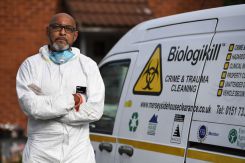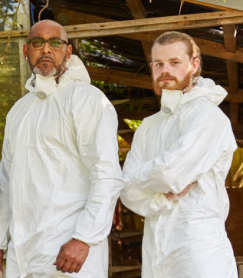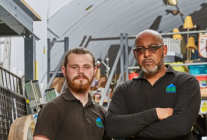
A Liverpool cleaner has shared his experiences on the frontline in the fight against the deadly coronavirus.
George Mensah, 56, from Mossley Hill, runs biohazard cleaning company Biologikill, which specialises in cleaning up harmful substances.
In more ‘normal’ times, George focuses on cleaning other substances that are deemed harmful to humans.
He is best known for his appearances on ITV documentary Call The Cleaners- which took viewers behind the scenes of some of the more grizzly clean-up operations carried out by his team.
This usually means cleaning murder scenes, environmental waste and animal waste, as well as cleaning decomposing materials and fumigating buildings.
But the coronavirus presents a particularly harmful threat, with the number of infections and deaths across the country rising each day.
With the spread of the virus and the threat of contamination, George says he has been asked to carry out hospital level cleans at places from gyms to banks across the North West.
George and his team are usually the first on the scene to make a premises safe after a confirmed report of coronavirus.
He told the ECHO “Really it’s the same kind of operation that we are used to carrying out with anything else that is harmful to humans or the environment.
“Once you’re protected with personal protective equipment and you’ve had the training you deal with it as you could with most other germs or bacteria using a hazmat suit as you would when cleaning up contamination or something that’s decomposing.
“On Monday night we had a phone call from a client in Manchester that had closed down due to a coronavirus scare. We were called in after hours and then set about decontaminating all the hotspots.
“I do not think we are doing enough to combat the spread of the virus. Look at China, they are sanitizing the roads and all public spaces but in Europe that isn’t happening. Now, Spain, France and Italy look proactive but it’s as if we’ve been told to carry on as normal.”
One problem George says is becoming particularly acute for key workers and cleaners coming into contact with the virus is the dwindling supply of personal protective equipment such as masks.
He said he’s been made aware of funeral directors running out of masks that they would usually wear while dealing with a corpse.
He added: “It’s becoming hard for us because we could run out of masks. I think it will eventually run out and that’s like being in the army but not having any bullets."
For George, handwashing and personal hygiene remains one of the most important measures that we can all take to halt the spread of the virus.
But he stressed that people must wash their hands whenever they touch a surface that is likely to have been contaminated.
He also had a strong message for people who are ignoring government advice and still going about their normal lives.
He added: “I’ve been on social media and people don’t seem to be aware that - while hand washing is great- you have to wash your hands every time you touch something which could have been contaminated.
“If you’ve been out shopping, you must wash your hands after touching a shopping trolley or a self-service checkout, for instance.
“It’s really not a good idea to keep going to the gym. It’s probably the worst place you could go in terms of hygiene and likelihood of picking up the virus.”
When asked about the effectiveness of hand sanitizer - a product which has flown off the shelves in recent weeks - George said: “Hand sanitizer is brilliant but it really should only be used when you have no access to soap and hot running water.
“You shouldn’t be using it at home. You shouldn’t open the top drawer and get the sanitizer out when you have access to everything you need at home which has the same effect."
Neighbours endured years of hell living next to a house piled high with rubbish
Neighbours speak out of the reality of life next hoarder house from hell
The ECHO was offered an insight into the secret life of our region's hoarders as one cleaning team lifted the lid on how these horror properties are cleared.
Neighbours living near this Runcorn house reported seeing "rats jumping in the window" and couldn't even sit out in their garden out of fears over the vermin infestation.
Grandparents Stephen Dowd, 49, and Colette Dowd, 48, have lived next to this rat-infested home for years, and have revealed the toll hoarding can take on a community.
Business owners Stephen and Colette said they couldn't let their grandchildren play outside because they feared rats were on the children's toys.
They added they "could not believe" the scale of clutter shown to them after they saw the interior of the crumbling home.
Our reporter was invited in to see the true scale of the problem by Merseyside House Clearing, who are tasked with cleaning out the mountains of rubbish found inside.
The company's owner, George Mensah, said he has been tasked with gutting properties that are packed to the brim with clutter and has been faced with gruesome and disturbing collections in his years of service.
George said the property in Runcorn was "one of the worst" he had seen in 10 years, and that he had to navigate around dozens of flies "flying into each other" inside.
The ECHO was invited along to the first day of the mammoth project of clearing the Runcorn home.
As George opened the door and paved the way safely for us to peek inside, the first thing to notice was the overwhelming smell of damp, dust and dead vermin.
A number of toasters, kettles and electrical items were piled up among the sea of items we could see, as well as decade-old magazines.
Thick grime was visible on the walls, fridge and windows as the lace, white curtains had turned black on the windows.
For safety reasons, we were not allowed to fully enter the property, but George's first-hand footage revealed how far the stacked items stretched to.
A dead rat was also visible on top of the discarded fireplace, as many of the belongings bore shredding marks from where the animals had made their way through.
A dead rat on the gas fire in the living room (Image: Andrew Teebay/Liverpool Echo)
Stephen, who has lived next to the home for 20 years, said he and his wife had previously tried to help the owners, and have made the brave decision to buy the property in the hopes of helping to restore the home to what it used to be.
The tenants have since been moved into a temporary house and are on the road to getting another home.
Stephen said: “It’s been unbelievable really, we had no idea what we were living next to. We came home off holiday and saw rats running round our garden, then we got in touch with environmental health who came and left rat poison, and then we realised it must have been coming from next door.”
Stephen and Colette Dowd outside of the property Colette, a former member of the armed forces, added: “We didn’t know the extent of it, there was no way of knowing they were living like that. We just kept saying there’s something not right here.
“We’ve been saying you can’t believe that someone could live like that. We’re still in shock, every day you’re finding something more shocking.”
During the summer’s heatwave, Stephen said the couple were unable to leave any windows or doors open, for fear of rats and flies, and had to invest in air conditioning supplies.
George’s company routinely clean hoarder’s properties, but said it is “rare” you hear form neighbours and communities whose lives are affected.
He said: “We are very passionate about our work and are non-judgmental towards the individual in question.
“A lot of clients and their families are embarrassed over the situation, we do a lot of work with mental health organisations, the majority of hoarders tend to be the elderly who live on their own.
“Saying that, hoarding has no preference, no conscience.”
He added: “We’ve helped people who collect cigarette butts, people who collect dead cats in shoe boxes. One of the worst ones we found was someone who had a sex dungeon hidden.
“You name it, we’ve seen it, everyone has a secret."
George said: “Each job you take on, it’s like the person becomes part of you, you grow to love it. It’s like becoming a carer and a whole lot of people who you help you end up becoming friends with.”
Stephen and Colette said they “felt sorry” for their neighbours and have called for more help to be given to hoarders.
Colette said: “I think there needs to be a special helpline like they [have] for Childline, because people are desperate and they need help.
“We’ve spoken to the people who have lived here and we’re sorry for what’s happened. I think there could have been a stop to this, if there was somewhere they could have rung and asked for some sort of help.”
George said there is “help out there” through the NHS and social services, but said he believed “the public” need to change their outlook on hoarding to feel able to speak about it.
He said: “It’s down to the family, or a neighbour to come forward and say I’m concerned. There’s enough help out there, but it’s breaking the taboo – people think it’s embarrassing.
“It’s sad sometimes, but a lot of people feel this.”
More about Merseyside House Clearance and the work they do can be found out and followed here on their Instagram account.
Inside the homes of Britain's dirtiest hoarders: Cleaning boss reveals his worst jobs including clearing out shoe boxes full of dead cats, jars of human waste and sex toys.
George Mensah owns a company in Merseyside that empties hoarders homes usually after they've died.
Mr Mensah claims he has found fingernail cuttings, bottles of urine and a basement full of bondage and porn.
Hoarding Disorder was officially recognised by the NHS in 2013 as a disorder that people can suffer from.
The cleaning boss claims it is a rising problem that can happen to anyone no matter your age or class.
From mountains of milk bottles to hundreds of cans of spaghetti hoops, a cleaning business boss has revealed some of the worst cases of hoarding he has seen.
George Mensah, who owns The Merseyside House Clearance company, spends his working days trawling through piles weird and wonderful items collected at people's homes.
The cleaner has the ambitious task of clearing out properties that are overflowing with human waste and clutter, Jars of human faeces, bottles of urine and dead cats are just a few of the gruesome
discoveries George has made over the past eight years.
Inside hoarders' homes filled with piles of old rubbish as council launches new service to help mentally ill
He said: "Where do I start? We have found jars of human faeces, bottles of urine, a huge amount of custom-made sex toys - in one house the owner was a porn hoarder and the basement was absolutely full of bondage accessories, porn dvd’s and magazines.
“In another, we found eight dead cats, all in shoe boxes.
“Then you get the general waste such as empty plastic milk bottles from floor to ceiling, cigarette butts and newspapers.
“In one house on Merseyside the amount of rubbish was so high, the lightbulb was actually resting on the pile of rubbish.
“And when we got down to the floor there were newspapers from 1987 - she had been hoarding for decades.”
George said the hoarding can't be blamed on a specific demographic, as he has turned up to £750,000 houses filled to the brim with hoarded items.
Sex toys and nail-clippings are among the grisly discoveries George has made.
He added that he and his team learn a lot about the owner of the properties they clean, and some hoarders have specific collector addictions.
He said: “There is always a story behind it.
“They are not just dirty people, there is usually an underlying issue.
“When you clear a hoarder’s house, by the time you walk away from there, you know that individual.
“Because you are delving real deep down into their lives really.
"We know what they like to eat, after finding hundreds of cans of spaghetti hoops, we know what they like to read or what they do.
“There are people who just sit there and order stuff from QVC.
“We’ve seen piles of George Forman grills, microwaves, hoovers - some still in boxes.
“A lot of stuff goes to the tip, but we give a lot to charities as well.”
George launched his business eight years ago, and has been trawling through people's clutter ever since.
Mostly, families of hoarders request the help of George and his team after the death of a relative, however, some referrals are made through social services, the NHS and even the fire service.
George said: “One of our biggest jobs last year and I think one of the biggest hoards in the UK, was a semi-detached house which we cleaned 16 tonnes of rubbish from.
“We found three cars that the family didn’t even know he had, because the property was so overgrown and full.”
However, some discoveries are a little more gruesome and even quite personal.
He added: “When I unlock that door, I don’t know what I am going into.
“On a number of occasions, we have come across containers of urine and even congealed saliva and spit, jars of human faeces and fingernail cuttings.
“Sometimes the smell does really get to you.
“There was a house in Merseyside which we were cleaning for a man whose dad had died and when we had done, we found this loose floorboard.
“When I lifted it up there was a letter from the mistress of the man who lived there, saying that she was pregnant.
“So the son who we were cleaning the house up for actually had a brother or sister somewhere he didn’t know about.
“I put the letter back and didn’t say anything - it didn’t feel like my place.”
A lot of the clutter ends up at the tip, however, some is given to charity
In May 2013 Hoarding Disorder was officially recognised as a mental disorder by the NHS.
And in 2016 the disorder actually claimed the life of two excessive hoarders from Allerton, who perished in a fire at their home, after firefighters were unable to gain entry due to the house being
so full of contents.
George, who is also a forensic cleaner, said: “If you get into a car and drive recklessly it is an offence.
“But if you live in a property and you have an electric heater, next to a gas bottle surrounded by piles of newspapers, rubbish, plastics etc then you are living recklessly and that’s the dangerous
side of hoarding.
“It can also be sad, especially when you are dealing with people’s houses who are still with us.
“You can’t go in like a bull in a china shop because it’s their property, so you have to respect that.
“There are obviously pros and cons but I absolutely love my job - I wouldn’t change it for anything.”
Long after the police have left a crime scene, and while a grieving family is still reeling from the death of a loved one, there is a big job that still needs to be done.
The clean-up.
You see once the body is taken away a lot of people think it is the police or the council’s job to clean up - it isn’t.
Often relatives or landlords are left to deal with the aftermath of a death - violent or otherwise.
That is when they call George Mensah, a crime scene cleaner who specialises in dealing with the mess left behind in a dignified fashion.
He said: “We get the call, we don’t know what it is or where we are going - but it is never easy.
“It is even worse if people die naturally at home, because it becomes their family or landlords job to deal with what is left.
“That is when me and my team get involved.
“We do what needs to be done.”
The 53-year-old runs Merseyside House Clearance, a company that, alongside dealing with hoarders, specialises in after death cleanups, and it is a messy business.
He told the ECHO: “As soon as someone dies they start to decay - and it can be sped up or slowed down by the environment.
“If it is cold it goes slower, but a lot of times people, especially older people, die with the heating on and it just accelerates the process.
“After a few days a body becomes mostly liquid - and muscles and skin start to break down.
“In the worst situations, if they have been there four or five days and the heat is on, it can make a gruesome mess.”
This gruesome scene is often why a body is discovered in the first place.
“The liquid from a body can go through mattresses, carpets, floorboards - sometimes that is how people find out that the person in the flat above them has died.
Obviously, sometimes people spot milk or mail piling up inside the house.”
But after that the most obvious sign that someone has died is the flies.
“People will see wave upon wave of blue bottles on someone’s window as they walk past - like its covered in a black sheet,” he explained.
“That is when they realise something is wrong.”
But while George and his staff can be called to the scenes of the most horrific murders, he explains that most people die in bed, or in an armchair in front of the TV.
“When we turn up at a house we’re always respectful - we’ll talk to the police or the family and try and find out what needs to be done.
“We get to the scene we’re wearing respirators, full body suits and goggles.
“But sometimes the smell is still over powering, so you go in with Vicks Vaporub up your nose to deal with it.”
Sometimes the sudden or tragic nature of a death can make the work harder.
George said: “You can be called to suicides or car crashes and they can be especially difficult.
“What has just happened was a tragedy and often the family wants to come and lay flowers or see the site where their loved one died.
“Well when the police are finished, there is often still a lot of blood and staining.
“It can’t just be washed down the drain - it has to be dealt with properly, especially with the risk of blood-borne diseases.
“So that is when we go to work - it can be particularly difficult I’ve found bits of a human skull or a finger and had to stop and tell the police.”
But despite years in his profession, George still has his fears.
“I can deal with the leftovers after a body has been taken away - I’ve made a living from it,” he said.
“But I could never be a mortician, I just couldn’t be alone in a room and embalm a body.”
But despite the sometimes gruesome work involved George explains that he loves his job.
“It is recession proof“ Also, we can have a laugh sometimes - it is just like any other job you have a laugh, talk about the football - just like other offices you have to pass the time.”
But the specialist - whose company appears in ITV’s Call the Cleaners - isn’t going to be round to scrub your shower.
“I am not really a cleaner - this isn’t a maid’s service,” George said.
“We are waging a war against man’s oldest enemy, germs, and I take it very seriously.”
“Once we got a call from this family asking us to come and handle this job for them,” said George.
“They were stood outside this really grand house, but they wouldn’t go in, they just handed us the keys and said, ‘it is in the basement’.
“It was a full sex dungeon - with chains and crosses on the wall and porn everywhere.
“They asked us to handle it discretely, so we chopped all the equipment to bits and threw them in an incinerator, no questions asked.”
But it isn’t just the dead George has to help, he does a shift for the living as well.
He told the ECHO: “We also do a lot of hoarders - especially older people who ended up in the hospital and can’t go home until their house is clean and hygienic.
“Obviously we do our best not to throw stuff away, just to deep clean everything.
“But the state of some of these places - toilets overflowing with faeces and photos stuck together with the rotten organic matter. “So sometimes you need to bin it.
“But to be honest not enough is done to help these people when the council or whoever first find out and it gets worse and worse.
“Often we can get through to them in a way that people can’t.
“We’re not psychiatrists - I just say ‘when was the last time you had a couple of mates round to watch the match or a lady friend over?”
But despite seeming a little macabre - George explains that his work is really about people.
He said: “When you go through somebody’s things - dead or alive - you get to know them.
“I know more about some people’s Granddad than they do.
“I can tell you what they smoked, drank, what they read and what kind of women they fancied.
“Sometimes you find out stuff that you wouldn’t want to tell the family, so I don’t.
“Better to leave them with their memories.”
By Jenny Kirkham
27 Aug 2020
Mummified rats and rubbish reaching the ceiling in the home of 'Britain's biggest hoarder'
Cleaners had to push their way into Paul's home after he began hoarding when his mum died 25 years ago
A mummified rat found amongst Paul's belongings (Image: Channel 5/ Hoarders)
"Britain's biggest hoarder" lived alongside mummified rats inside his Crosby home where rubbish reached the ceiling.
Paul was forced to call in specialist cleaners when the piles of rubbish and mountains of collections reached the ceiling of his Merseyside house.
The 72-year-old's bathroom and kitchen had been completely unusable for years but Paul said he got around this by eating outside, going to cafes and going elsewhere to have a shower.
Paul and his mother bought the three bedroom house 35 years ago, after his father died, for £23,000.
On Channel 5 documentary Hoarders, which aired on Thursday night, he said: "We had a nice modern kitchen, nice garden as well, it was a very attractive house."
But hoarding is often triggered by traumatic life events and the problems in Paul's home began after the said death of his mum.
He said: "Four and a half years after my mother died, in 1995, that's when I started collecting.
"I think in the back of my mind, I thought 'that will look nice in the house' a bit like what my mother had.
"And then it began to overwhelm me over time and got too much.
"The books are the first thing that started to pile up and I've got a couple thousands books now."
During the programme, George Mensah of Merseyside House Clearance was called in to clear Paul's home.
Unable to even enter the property, George was forced to climb over the mounds of belongings that Paul had accumulated and even used a special camera to be able to see further into the home.
During his survey, the master cleaner found rats that had become trapped in the house and then died, being left to rot and stiffen amongst the rubbish.
Some of the most commonly hoarded items, such as papers, books and clothing, were all found in the rooms of the house as George made his way through.
This had filled up every room in Paul's house, including the hallway, but some other items that Paul had collected were slightly more unusual.
Roman artefacts, weapons and armour were also discovered during the clear out.
One bedroom was the only area of the house that George could properly access.
Paul hoped that cleaners could shift his hoard for him and he would be able to sell the home, which lies on a quiet street in Sefton, to fund his retirement.
During the clean up process, Paul found it difficult to let some of his items go and could be heard telling George's colleagues not to throw books away and saying he wanted to keep a part of the Roman wall in York.
After some of the hoard was cleared, Paul was informed that due to the damage he had caused to his home by the hoarding, it would only be worth £110,000 on the market.
It took eight skips and nine days in total to clear Paul's house before potential buyers were able to come and view the property.






